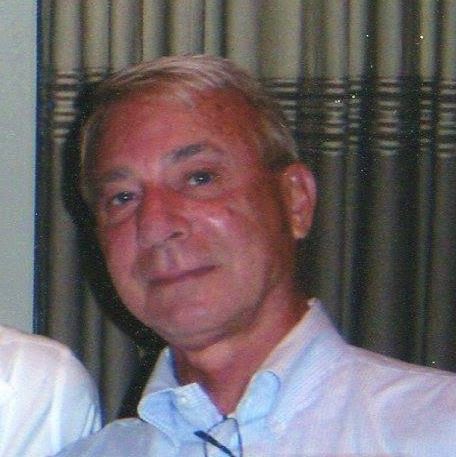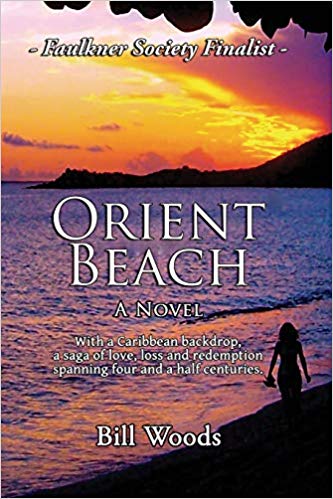FEW REGRETS: AN INTERVIEW WITH BILL WOODS

Bill Woods, author of the new novel Orient Beach, has been a published writer 57 years–sort of. He first published a story at age 15 in the Sunday Edition of The Memphis Commercial Appeal after winning a short story contest.
But then life got in the way.
“I had a little business meeting with myself when I finished high school,” Bill recalls. “On the one hand, I really, really wanted to be a writer. However, I grew up poor. Becoming a starving artist did not seem romantic to me. So now, a retired engineer, I’m back where I started. I still want to be the writer I wanted to be at 15. “
A lifetime later, Woods has become that writer. Over the past seven years, he has written two books, starting with the novel Orient Beach, a finalist in the 2018 Faulkner Society Competition. In this interview, he answers some questions about the book and his long-overdue return to the literary life.
TZ: Some of your reviews call Orient Beach a “historical adventure,” although it is set in the future as much as the past. In fact, it is set in three different time periods (1580, 2002, and 2023). Why did you pick these three particular years?
BW: Yes, I think it is historical, at least by my definition. Some things transcend time. In the novel, these are represented by a mysterious gold statue and the island of St Martin itself. Also, the human experience does not change. The questions we ask ourselves in quiet times, the conflicts of our duel natures, the inevitable dilemmas were the same in 1580 and will be the same in 2023. In Requiem For a Nun, Faulkner wrote, “The past is never dead. It’s not even past.” I try to display this continuum.
TZ: What challenges and/or opportunities did you have integrating the times and characters into a single story?
BW: I wrote Part 2 of the novel first based on my first impressions of St Martin in 2002. During a sunrise walk , I encountered a lone ropy-haired nudist sitting in lotus position at the water’s edge. The night’s waves had made the sand pristine again except for his footprints. When I returned home, I created his life in fiction.
While writing, it occurred to me this scene of the lone man looking over the ocean at distant Caribbean islands could be a thousand years ago or a thousand years in the future. He became for me universal man. In Part 1, I recreated him as a priest marooned among a tribe or Arawak Indians in 1580; and then again in Part 3 as a man of mixed heritage who grew up on the island in 2023.
“The only thing I regret is not paying attention in 11th grade English class.”
TZ: What role does setting play in Orient Beach? And why did you choose to set it in St. Martin?
BW: As I wrote, Orient Beach became a character rather than just a backdrop, a round character whose personality evolved over time under the influences of nature and civilization. Each Caribbean island is unique based on its history during colonization. I try to give the reader a taste of these distinct flavors.
TZ: Besides “historical novel,” Orient Beach has also been labeled a great “beach read,” “much more than a beach read,” and a book to read while curled up by the fire mixed with “something involving rum.” You yourself call it a “literary novel.” What exactly does that term mean to you? And how important do you think these kinds of categorizations are to the writing process and/or to marketing a book?
BW: The ideal experience of Orient Beach is to read it while listening to the sound of crashing waves. The reader becomes part of the novel. Second best, is to be swept into the story vicariously.
A literary novel speaks to the human experience. Plot and setting are secondary to character development. I remember Moby Dick, for example, not for the exciting storyline, but for the characters of Ahab and Pequod. However, thought-provoking is not salable today by traditional publishing because the mass market wants diversion from thought. Traditional publishers are business people, not art critics. This is not criticism of the industry, just recognition of the lay of the land. Dozens of novels as significant as Moby Dick were written last year. You and I will never read them because they were never published.
TZ: Some readers have compared your style and/or themes to those of Ernest Hemingway, Kurt Vonnegut, and Jack Kerouac. Do you think any of those comparisons are accurate—and, if so, was that intentional? Are there other authors that you particularly admire or who have influenced your writing?
BW: Two things I learned from Hemingway: “Nobility is being superior to your former self” and “The writer’s job is to tell the truth.” And maybe a third thing—it’s easier to tell the truth in fiction than history. From Vonnegut I learned people become who they pretend to be. Nobody, including one’s self, is knowable. From Kerouac, that nothing is so cathartic as bleeding onto paper. Flannery O’Connor taught me to leave room for the reader. What is not said can be more revealing than what is written.
TZ: You wanted to be a writer since high school but took off nearly sixty years before pursuing that passion. Looking back, do you think your teenage self made the right business decision? Life decision? Anything you’d do differently if you had it to do again?
BW: At age fifteen, I wanted to cause others to experience the transcendence I felt when reading literature. But alas, I had not yet lived and therefore had nothing to write about. The only thing I regret is not paying attention in 11th grade English class.
BW: The Muse of Wallace Rose is a novella about a pulp mystery writer who discovers his outlandish stories come true. The reader wanders with Wallace through that netherworld between fantasy and reality. I couple this with fifteen linked short stories with protagonists, both male and female, from seven to seventy. If the characters are synthesized into one, you get the author in harlequin disguise.
Terra Ziporyn
TERRA ZIPORYN is an award-winning novelist, playwright, and science writer whose numerous popular health and medical publications include The New Harvard Guide to Women’s Health, Nameless Diseases, and Alternative Medicine for Dummies. Her novels include Do Not Go Gentle, The Bliss of Solitude, and Time’s Fool, which in 2008 was awarded first prize for historical fiction by the Maryland Writers Association. Terra has participated in both the Bread Loaf Writers Conference and the Old Chatham Writers Conference and for many years was a member of Theatre Building Chicago’s Writers Workshop (New Tuners). A former associate editor of the Journal of the American Medical Association (JAMA), she has a PhD in the history of science and medicine from the University of Chicago and a BA in both history and biology from Yale University, where she also studied playwriting with Ted Tally. Her latest novel, Permanent Makeup, is available in paperback and as a Kindle Select Book.
- Web |
- More Posts(106)
